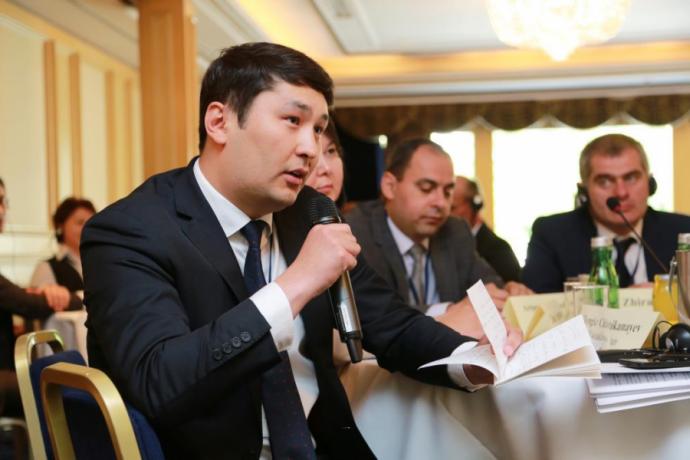

Tengiz Chikanayev, alumnus 2016, MA in Economic Governance and Development Programme works at the Treasury Committee of the Ministry of Finance of the Republic of Kazakhstan and in his interview he shares how he manages to cope with all his important tasks and responsivities.
Q: Tengiz, you came to OSCE Academy with some experience in studies and employment? Why did you decide get another MA degree?
Before coming to the OSCE Academy, I had been working in the Treasury Committee of the Ministry of Finance of the Republic of Kazakhstan as a chief-expert in internal audit division. However, at that time I was thinking about getting another master’s degree in economics in order to get a deeper understanding of the economics discipline. Without deeper understanding of economics, it is difficult to succeed in PhD. Getting PhD is my primary goal.
Before applying to the master’s degree at the OSCE Academy, I did my bachelor’s degree at the Kazakh National Technical University named after K.I. Satpayev and master’s degree at the University of Essex.
Over last ten years, I have been working in the banking and public sectors. Currently, I am a public servant at the Treasury Committee of the MoF of Kazakhstan.
Why I chose OSCE Academy? Firstly because of the scholarship. Secondly, because of the great teachers that are coming from all over the world to Kyrgyzstan. Finally because of the internship opportunities in Europe.
Q: What has changed after your graduation of the MA in Economic Governance and Development Programme?
After graduation with a MA in Economic Governance and Development Programme, I observed some positive changes like appreciating learning more and re-boot my career. Later, I was appointed as a head of the analysis and evaluation division of the Treasury Committee of the Ministry of Finance of the Republic of Kazakhstan. In this division, my duties have increased several times.
Q: What are your responsibilities now?
Currently, I am supervising eight people in my division. My responsibilities in this regard are producing macroeconomic and fiscal policies coordinate territorial treasuries to compile the national budget and fiscal discipline and debt management. Monthly I produce a budget execution report for the Minister of Finance.
For example, the analysis of the state budget requires a wide range of analytical skills and computational thinking.
How would you assess the effectiveness of the state ongoing programs or public spending from the treasury perspective?
In Kazakhstan, we have several levels of budget, such as 1) the republican budget; 2) the regional budget, the budgets of the city of republican significance, the capital; 3) district (cities of regional significance) budget; 4) budgets of the city of district significance, village, village, rural district. Moreover, we have an oil fund that transfers money to the republic budget for certain development programs.
The Government entities that spend the most are the Ministry of Labor and Social Protection of the Population 2,6 trillion tenge and Ministry of Health 1 trillion tenge.
Every country in the world allocates the larger slice of its budget on the social aspects.
If you do an analysis of the state budget, you might observe that the economy of Kazakhstan has high state involvement. For instance, the treasury pays the salaries of every civil servant which includes 98,499 thousand people in a central state bodies along with its territorial divisions and local state bodies. There are around 13,029 public institutions in Kazakhstan.
At present, I also supervise the effectiveness of extensive network of seventeen departments, 188 district offices across Kazakhstan in regard to budget execution, reporting, and transparency.
After completing my MA at OSCE Academy, I implemented new mechanisms for budget execution in the Treasury Committee such as the introduction of the fourth budget level at the local government, treasury support of public procurement in the construction sector, and registration of PPP obligations and concession. At the same time, I conduct training for young financiers at the Finance Academy of the Ministry of Finance of Kazakhstan.
In September 2018, I met the Korean delegation from Korea Public Finance Information Services here in Astana who shared their knowledge in digital budgeting “digital brain – dBrain system”.
Q: This is very impressive and sounds like it keeps you busy 24/7. How do you manage your time?
After graduation in 2016, I have tried to effectively manage my time beginning with prioritizing goals and planning and delegating some tasks to other people. It is very important to break up assignments into separate parts. For instance, in budgeting we have four stages of budgeting like planning, approving by law, execution and inspection or control.
Q: What be your advice to our students and receipt graduates?
I would recommend OSCE Academy students and recent graduates embrace opportunities, to try new things, and ask for help when needed.
I strongly believe that the young generation of Kazakhstan who getting a quality education will lead our country to the bright future.